by Gary Alexander
June 21, 2023
As the summer driving season officially begins – today being the first day of summer – a smoky haze has descended over much of Canada and the Northern half of America. If you’re up for a vacation drive this weekend or July 4th, do like a half dozen of my relatives have done and come visit Western Washington, or drive to the Southeastern states – where high humidity sure beats choking on smoke – or fly overseas.

The problem is that you must burn some fossil fuel to make those trips, and our President just told an environmental group last week that climate change “is the only truly existential threat. It’s the existential threat. If we don’t meet the requirements that we’re looking at, we’re in real trouble.”
I wondered if the President forgot for a moment the possibility of nuclear war over the Ukrainian conflict with Russia – which controls more nuclear weapons than any other nation, including us – or the threat of an electro-magnetic pulse (EMP), which could be either natural or terrorist- or state-sponsored, which could wipe out our entire electric grid for months, maybe a year, killing perhaps the majority of us.
I don’t want to alarm anybody by adding more “existential” threats to the list, but there may be 10 worse things to worry about than climate change. What could happen when our $32 trillion debt soars to $50 trillion in the next decade, if no politician finds a backbone? How about the unintended ecological disaster the green police will force on us from mining rare minerals for EV car batteries, solar panels, and wind turbines, or the deaths from cold winters when those panels and turbines fail to deliver the necessary power in winter? And there could be another COVID pandemic, only worse. That was more “existential” than climate fears. A few inches increase in sea level, or maybe 1 to 2 degrees warming – IF that happens – is not our top “existential” threat, much less the only one. Even more alarmingly, our Defense Secretary Lloyd Austin talks about the “existential threat” of climate change when he should focus on our military.
But back to our President’s talk: Biden told a 4-Pinocchio whopper that never made it on the Washington Post’s list of Pinocchio lies, and got miniscule press coverage (that I could find), only an opening riff on the Larry Kudlow show on Fox Business News, and a Kudlow follow-up column in the New York Sun.
In his speech last week, President Biden blamed us, the American people, as the world’s worst polluters:
“Here’s the bottom line,” the President said, “we’re the ones that caused the problem — the United States. We cleared all our land. We did all the things that — to make our — make things more easy for us to make money. Not a bad thing at the time. No one really fully understood. But we, the major emitters in the world, have an obligation to help those countries.”
*Lest you think I may be taking any of these quotes out of context, here is a link to the complete text:
No, Mr. President. America generally plants trees so that we can harvest them, but China, under Mao, cut down most of their trees to build backyard furnaces in the Great Leap Forward and Cultural Revolution to melt farm tools into bullets to kill capitalists. The core of China is now a virtual desert, as is much of Asia and the Sahara and other lands. We have made ecological mistakes in the past, but we generally learn from our mistakes. We conserve resources through ownership of assets, and owners grow their assets.
Here is the culprit, Mr. President, if you dare speak ill of our #1 global opponent (hint: it’s not Russia).
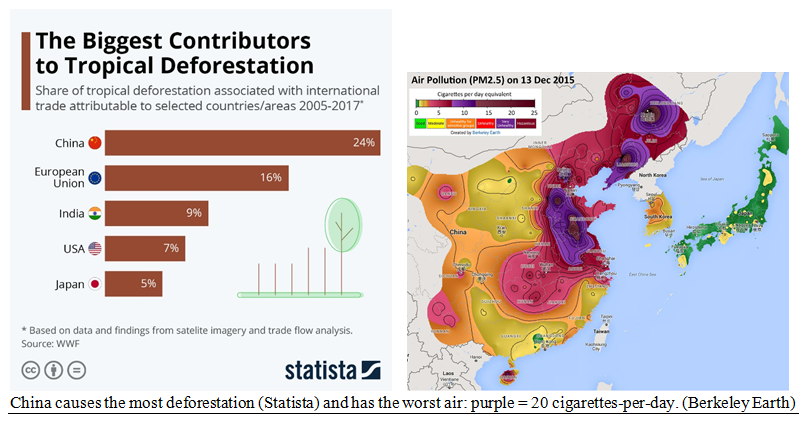
Notice the clean air in Japan, next door to China. When it comes to the largest net reduction of carbon dioxide (CO2) in the last measurable decade, the U.S. rises to the top of the list, by a long distance, followed by Germany and Japan – the third and fourth largest economies in the world – but the worst CO2 “pollution” comes from China (the #2 global economy), so a relevant question by the press would be, “We’re doing our part, Mr. President. What pressure are you putting on China to do their part?”
The U.S. is the largest reducer of CO2 emissions of any nation, by far:
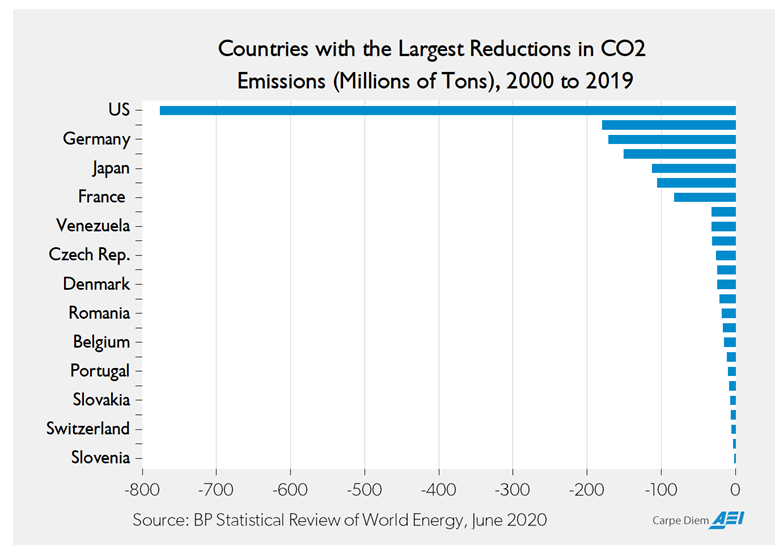
Despite China’s obvious failures, they talk a good talk and have fooled many green zealots into lauding their efforts and condemning the U.S., especially after the Trump administration refused to sign the Paris accords. But which would you rather have – a nation that is cleaning up its air and water but refuses to buckle under to global bureaucrats, or a nation that promises cleaner air and water but keeps polluting?
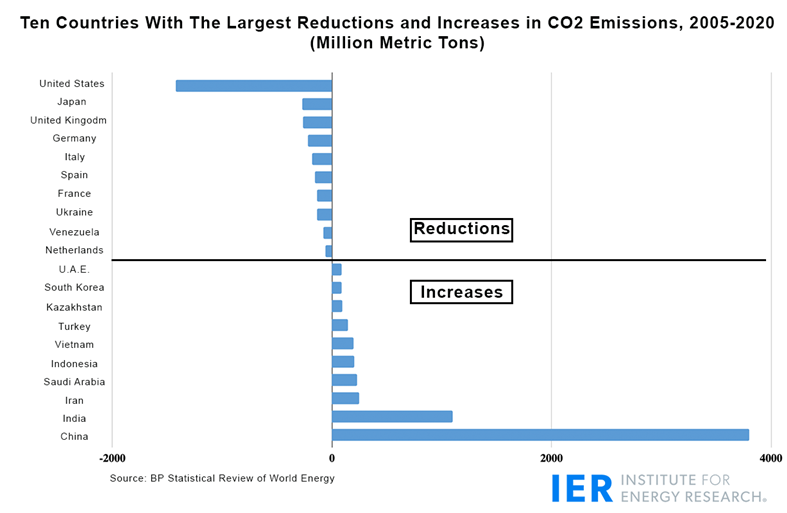
In his speech last week, our President slandered his fellow Americans instead of challenging China and India to do better, as an American leader has the right and obligation to do – to challenge our opponents.
Amazingly, not one major press outlet caught the President in this gross misstatement of fact. Also, the President was speaking to some presumed experts on the environment. Didn’t they know the facts? Why didn’t one of these contributors in the audience ask the President what he intended to do about China?
Turning to the investment angle, it looks like ESG (environmental, social, and governance) has lost its “mojo,” if it ever had any. From an investment perspective, ESG never quite took off, but it’s now no longer a magic formula in earnings conference calls. Company mentions of green and social initiatives during earnings calls have fallen off sharply in recent quarters, reversing a previously boastful approach.
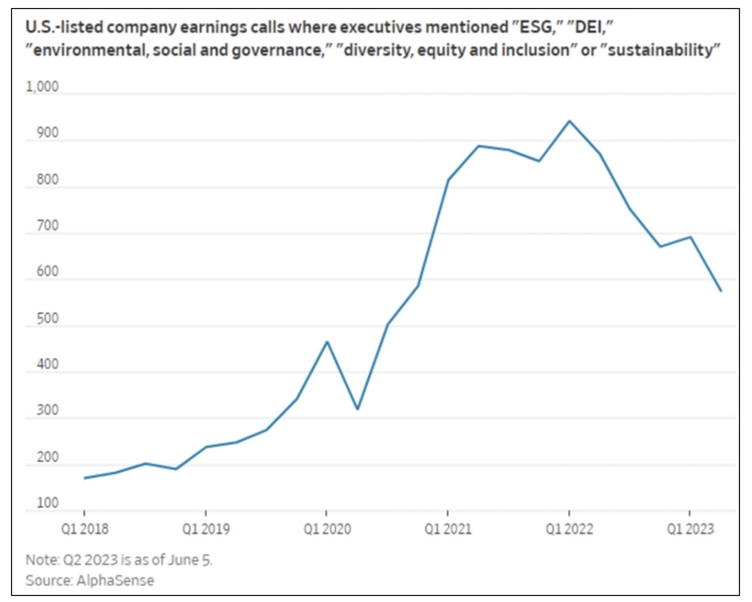
To close with a laugh, the President also delivered his daily gaffe when he went off script and admitted doing so: “We have plans to build a railroad from the Pacific all the way across the Indian Ocean. We have plans to build in — in Angola one of the largest solar plants in the world. I can go on, but I’m not. I’m going off-script. I’m going to get in trouble.” Here’s what he was proposing, in map form:
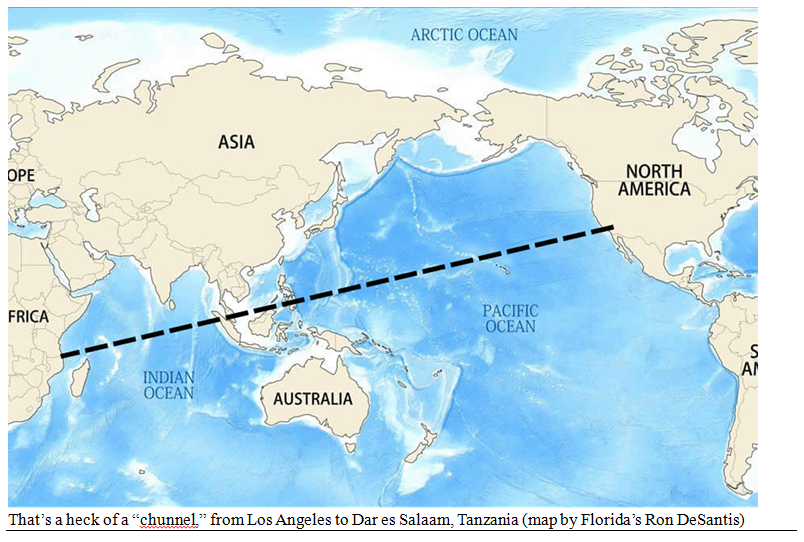
Can’t wait for that railroad across the ocean, that massive solar panel in Angola…and a new President.
I’m being partly whimsical. I am doing my part to combat global warming – if it remains a serious threat. I only fly once or twice a year; I drive less than 4,000 miles a year and telecommute via the Internet. I live on 5.25 shady acres, of which five acres are oxygen-spewing Cedars and Douglas Firs, so I’ve got a huge Oxygen-positive footprint, while many global warming zealots own multiple mansions and fly private jets to conferences to scold us. I will place my bet on mankind, capitalism, and economic growth. More specifically, I believe we will solve energy challenges through technology, inventions, and free markets.
All content above represents the opinion of Gary Alexander of Navellier & Associates, Inc.
Also In This Issue
A Look Ahead by Louis Navellier
Muted Inflation News Warns of Potential Deflation Ahead
Income Mail by Bryan Perry
A Time to Consider Locking in Yields?
Growth Mail by Gary Alexander
Buy Some Gasoline to Drive Toward Cleaner Air!
Global Mail by Ivan Martchev
Recession May Still Be Around the Corner
Sector Spotlight by Jason Bodner
The Stock Market is Like…a Lopsided Soccer Game
View Full Archive
Read Past Issues Here
About The Author

Gary Alexander
SENIOR EDITOR
Gary Alexander has been Senior Writer at Navellier since 2009. He edits Navellier’s weekly Marketmail and writes a weekly Growth Mail column, in which he uses market history to support the case for growth stocks. For the previous 20 years before joining Navellier, he was Senior Executive Editor at InvestorPlace Media (formerly Phillips Publishing), where he worked with several leading investment analysts, including Louis Navellier (since 1997), helping launch Louis Navellier’s Blue Chip Growth and Global Growth newsletters.
Prior to that, Gary edited Wealth Magazine and Gold Newsletter and wrote various investment research reports for Jefferson Financial in New Orleans in the 1980s. He began his financial newsletter career with KCI Communications in 1980, where he served as consulting editor for Personal Finance newsletter while serving as general manager of KCI’s Alexandria House book division. Before that, he covered the economics beat for news magazines. All content of “Growth Mail” represents the opinion of Gary Alexander
Important Disclosures:
Although information in these reports has been obtained from and is based upon sources that Navellier believes to be reliable, Navellier does not guarantee its accuracy and it may be incomplete or condensed. All opinions and estimates constitute Navellier’s judgment as of the date the report was created and are subject to change without notice. These reports are for informational purposes only and are not a solicitation for the purchase or sale of a security. Any decision to purchase securities mentioned in these reports must take into account existing public information on such securities or any registered prospectus.To the extent permitted by law, neither Navellier & Associates, Inc., nor any of its affiliates, agents, or service providers assumes any liability or responsibility nor owes any duty of care for any consequences of any person acting or refraining to act in reliance on the information contained in this communication or for any decision based on it.
Past performance is no indication of future results. Investment in securities involves significant risk and has the potential for partial or complete loss of funds invested. It should not be assumed that any securities recommendations made by Navellier. in the future will be profitable or equal the performance of securities made in this report. Dividend payments are not guaranteed. The amount of a dividend payment, if any, can vary over time and issuers may reduce dividends paid on securities in the event of a recession or adverse event affecting a specific industry or issuer.
None of the stock information, data, and company information presented herein constitutes a recommendation by Navellier or a solicitation to buy or sell any securities. Any specific securities identified and described do not represent all of the securities purchased, sold, or recommended for advisory clients. The holdings identified do not represent all of the securities purchased, sold, or recommended for advisory clients and the reader should not assume that investments in the securities identified and discussed were or will be profitable.
Information presented is general information that does not take into account your individual circumstances, financial situation, or needs, nor does it present a personalized recommendation to you. Individual stocks presented may not be suitable for every investor. Investment in securities involves significant risk and has the potential for partial or complete loss of funds invested. Investment in fixed income securities has the potential for the investment return and principal value of an investment to fluctuate so that an investor’s holdings, when redeemed, may be worth less than their original cost.
One cannot invest directly in an index. Index is unmanaged and index performance does not reflect deduction of fees, expenses, or taxes. Presentation of Index data does not reflect a belief by Navellier that any stock index constitutes an investment alternative to any Navellier equity strategy or is necessarily comparable to such strategies. Among the most important differences between the Indices and Navellier strategies are that the Navellier equity strategies may (1) incur material management fees, (2) concentrate its investments in relatively few stocks, industries, or sectors, (3) have significantly greater trading activity and related costs, and (4) be significantly more or less volatile than the Indices.
ETF Risk: We may invest in exchange traded funds (“ETFs”) and some of our investment strategies are generally fully invested in ETFs. Like traditional mutual funds, ETFs charge asset-based fees, but they generally do not charge initial sales charges or redemption fees and investors typically pay only customary brokerage fees to buy and sell ETF shares. The fees and costs charged by ETFs held in client accounts will not be deducted from the compensation the client pays Navellier. ETF prices can fluctuate up or down, and a client account could lose money investing in an ETF if the prices of the securities owned by the ETF go down. ETFs are subject to additional risks:
- ETF shares may trade above or below their net asset value;
- An active trading market for an ETF’s shares may not develop or be maintained;
- The value of an ETF may be more volatile than the underlying portfolio of securities the ETF is designed to track;
- The cost of owning shares of the ETF may exceed those a client would incur by directly investing in the underlying securities; and
- Trading of an ETF’s shares may be halted if the listing exchange’s officials deem it appropriate, the shares are delisted from the exchange, or the activation of market-wide “circuit breakers” (which are tied to large decreases in stock prices) halts stock trading generally.
Grader Disclosures: Investment in equity strategies involves substantial risk and has the potential for partial or complete loss of funds invested. The sample portfolio and any accompanying charts are for informational purposes only and are not to be construed as a solicitation to buy or sell any financial instrument and should not be relied upon as the sole factor in an investment making decision. As a matter of normal and important disclosures to you, as a potential investor, please consider the following: The performance presented is not based on any actual securities trading, portfolio, or accounts, and the reported performance of the A, B, C, D, and F portfolios (collectively the “model portfolios”) should be considered mere “paper” or pro forma performance results based on Navellier’s research.
Investors evaluating any of Navellier & Associates, Inc.’s, (or its affiliates’) Investment Products must not use any information presented here, including the performance figures of the model portfolios, in their evaluation of any Navellier Investment Products. Navellier Investment Products include the firm’s mutual funds and managed accounts. The model portfolios, charts, and other information presented do not represent actual funded trades and are not actual funded portfolios. There are material differences between Navellier Investment Products’ portfolios and the model portfolios, research, and performance figures presented here. The model portfolios and the research results (1) may contain stocks or ETFs that are illiquid and difficult to trade; (2) may contain stock or ETF holdings materially different from actual funded Navellier Investment Product portfolios; (3) include the reinvestment of all dividends and other earnings, estimated trading costs, commissions, or management fees; and, (4) may not reflect prices obtained in an actual funded Navellier Investment Product portfolio. For these and other reasons, the reported performances of model portfolios do not reflect the performance results of Navellier’s actually funded and traded Investment Products. In most cases, Navellier’s Investment Products have materially lower performance results than the performances of the model portfolios presented.
This report contains statements that are, or may be considered to be, forward-looking statements. All statements that are not historical facts, including statements about our beliefs or expectations, are “forward-looking statements” within the meaning of The U.S. Private Securities Litigation Reform Act of 1995. These statements may be identified by such forward-looking terminology as “expect,” “estimate,” “plan,” “intend,” “believe,” “anticipate,” “may,” “will,” “should,” “could,” “continue,” “project,” or similar statements or variations of such terms. Our forward-looking statements are based on a series of expectations, assumptions, and projections, are not guarantees of future results or performance, and involve substantial risks and uncertainty as described in Form ADV Part 2A of our filing with the Securities and Exchange Commission (SEC), which is available at www.adviserinfo.sec.gov or by requesting a copy by emailing info@navellier.com. All of our forward-looking statements are as of the date of this report only. We can give no assurance that such expectations or forward-looking statements will prove to be correct. Actual results may differ materially. You are urged to carefully consider all such factors.
FEDERAL TAX ADVICE DISCLAIMER: As required by U.S. Treasury Regulations, you are informed that, to the extent this presentation includes any federal tax advice, the presentation is not written by Navellier to be used, and cannot be used, for the purpose of avoiding federal tax penalties. Navellier does not advise on any income tax requirements or issues. Use of any information presented by Navellier is for general information only and does not represent tax advice either express or implied. You are encouraged to seek professional tax advice for income tax questions and assistance.
IMPORTANT NEWSLETTER DISCLOSURE:The hypothetical performance results for investment newsletters that are authored or edited by Louis Navellier, including Louis Navellier’s Growth Investor, Louis Navellier’s Breakthrough Stocks, Louis Navellier’s Accelerated Profits, and Louis Navellier’s Platinum Club, are not based on any actual securities trading, portfolio, or accounts, and the newsletters’ reported hypothetical performances should be considered mere “paper” or proforma hypothetical performance results and are not actual performance of real world trades. Navellier & Associates, Inc. does not have any relation to or affiliation with the owner of these newsletters. There are material differences between Navellier Investment Products’ portfolios and the InvestorPlace Media, LLC newsletter portfolios authored by Louis Navellier. The InvestorPlace Media, LLC newsletters contain hypothetical performance that do not include transaction costs, advisory fees, or other fees a client might incur if actual investments and trades were being made by an investor. As a result, newsletter performance should not be used to evaluate Navellier Investment services which are separate and different from the newsletters. The owner of the newsletters is InvestorPlace Media, LLC and any questions concerning the newsletters, including any newsletter advertising or hypothetical Newsletter performance claims, (which are calculated solely by Investor Place Media and not Navellier) should be referred to InvestorPlace Media, LLC at (800) 718-8289.
Please note that Navellier & Associates and the Navellier Private Client Group are managed completely independent of the newsletters owned and published by InvestorPlace Media, LLC and written and edited by Louis Navellier, and investment performance of the newsletters should in no way be considered indicative of potential future investment performance for any Navellier & Associates separately managed account portfolio. Potential investors should consult with their financial advisor before investing in any Navellier Investment Product.
Navellier claims compliance with Global Investment Performance Standards (GIPS). To receive a complete list and descriptions of Navellier’s composites and/or a presentation that adheres to the GIPS standards, please contact Navellier or click here. It should not be assumed that any securities recommendations made by Navellier & Associates, Inc. in the future will be profitable or equal the performance of securities made in this report.
FactSet Disclosure: Navellier does not independently calculate the statistical information included in the attached report. The calculation and the information are provided by FactSet, a company not related to Navellier. Although information contained in the report has been obtained from FactSet and is based on sources Navellier believes to be reliable, Navellier does not guarantee its accuracy, and it may be incomplete or condensed. The report and the related FactSet sourced information are provided on an “as is” basis. The user assumes the entire risk of any use made of this information. Investors should consider the report as only a single factor in making their investment decision. The report is for informational purposes only and is not intended as an offer or solicitation for the purchase or sale of a security. FactSet sourced information is the exclusive property of FactSet. Without prior written permission of FactSet, this information may not be reproduced, disseminated or used to create any financial products. All indices are unmanaged and performance of the indices include reinvestment of dividends and interest income, unless otherwise noted, are not illustrative of any particular investment and an investment cannot be made in any index. Past performance is no guarantee of future results.
